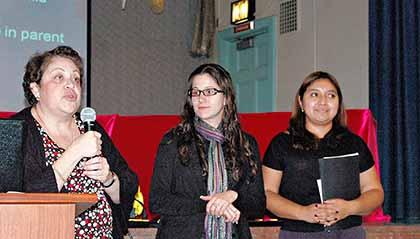By Rebecca Henely
Teaming up with child-care professionals, City Councilwoman Julissa Ferreras (D-East Elmhurst) warned a crowd of about 30 people at IS 149 last Thursday of the dangers of shaking a baby.
“This can be life-threatening and it will cause permanent damage,” Ferreras said of shaking a child.
The council woman, who invited representatives from the Plaza Del Sol Family Health Center and the city Administration for Children’s Services, held the workshop at the school on 93-11 34th Ave. in Jackson Heights on the effects of shaken baby syndrome in response to two incidents that happened in December.
A 26-year-old Corona woman, Susana Gil, who had recently become the legal guardian of her 21-month-old nephew Alexander Delgado, allegedly shook Alexander Dec. 27 after he started crying, the DA said. Gil is accused of not getting Alexander medical assistance until Dec. 31, after which he was pronounced brain dead, the DA said. Gil was charged with assault and endangering the welfare of a child and faces up to 25 years in prison, the DA said.
In a similar but more heavily reported incident, 26-year-old Ana Delarosa, who was baby-sitting 3-month-old Addison Reinoso-Xoyatla, allegedly shook the baby Dec. 29 when she could not get him to stop crying, causing brain damage, the DA said. Since the incident happened in the aftermath of the heavy snowstorm that crippled the ability of EMS workers to respond to disasters, Addison’s injury was originally thought to be caused by the snowstorm. He was taken off life support and died Jan. 5. Delarosa was charged with murder and endangering the welfare of a child and faces up to 25 years to life in prison if convicted, the DA said.
“The majority of the time this happens when the child is crying,” Dr. Udit Kondal of Plaza Del Sol said of the children who are the victims of shaken baby syndrome.
Kondal showed a video simulation of a shaken baby, pointing out how shaking can cause hemorrhages in the brain and eyes as well as bone fractures because their bodies and especially their necks are too fragile to sustain such impact. He said babies who are shaken can develop learning disabilities or die.
He suggested parents use a system of rewards instead of physical discipline for their kids.
“Once you get in that habit, you might find you can control them more,” he said.
Alba Valencia of ACS conducted a presentation largely in Spanish, saying that children who were in homes suffering from poverty, domestic violence, alcohol and drug abuse, unemployment and other problems were at high risk for abuse. She said shaken baby syndrome does not necessarily come from cruelty, but from ignorance.
“Many times the caretakers are not properly trained,” Valencia said.
Literature distributed at the event recommended parents take time out and get someone else to watch their baby for a little while if they feel the urge to shake their child and described coping tactics for stress.
Valencia said babies use crying as a way to communicate and compared a baby’s crying to an immigrant trying to speak to others in an unknown tongue.
“A child cries because a child does not know how to express feelings,” she said.
Reach reporter Rebecca Henely by e-mail at rhenely@cnglocal.com or by phone at 718-260-4564.

































